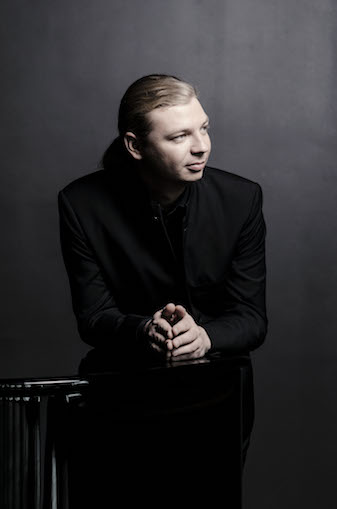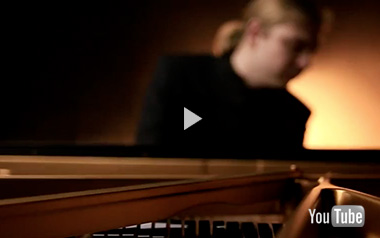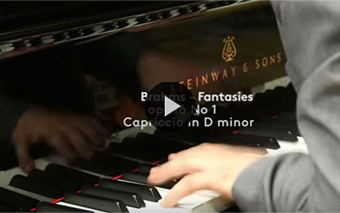Next Concerts
February 19, 2026
Odense
Odense C, Denmark
Ravel: Piano Concerto in G major, M.83
– Pierre Bleuse (conductor)
Venue: Odense Concert Hall, Odense
Mar 7, 2026
Netherlands Philharmonic / European Tour
Amsterdam, Netherlands
Brahms: Piano Concerto No.2 in B-flat major, Op.83
– Lorenzo Viotti (conductor)
Venue: The Concertgebouw, Amsterdam
Reviews
April 2nd, 2013
Recording: Prokofiev Pianos Sonatas Nos. 6, 7 and 8 (Onyx Classics, ONYX 4111)
“26 year-old Denis Kozhukhin arrives on the recording scene fully-fledged, like Athena springing from the head of Zeus. Intellect is central: I’ve never heard so much revelatory detail in Prokofiev’s triptych of dark and painful masterpieces. Kozhukhin has a way of bringing out the detail of the inner parts, or even a usually inconsequential-seeming bass line, that highlights the drama instead of distracting from it; there’s so much internal play in the droll march-scherzo of the Sixth Sonata, so much genius revealed about the way Prokofiev elaborates or dislocates the minuet theme at the heart of the Eighth. The touch is one that the composer-pianist would probably applaud: clear rather than dry, recorded with superb presence and ringing treble, bringing in the sustaining pedal with mesmerising care only to nuance the more pensive themes…
Kozhukhin does pull all the strands together in the great parade of the Eighth’s concluding vivace, a stunning tour de force at the end of an always though-provoking trilogy”.
BBC Music Magazine, five stars, May 2013
“Denis Kozhukhin gives a magnificent account of Prokofiev’s Sixth Piano Sonata (1940), technically and musically, playing with fervour and clarity, investing the music with intensity, feeling and exploration, and holding completely the listener’s attention. In the first movement, violence and numbed tranquillity vie with one another. Kozhukhin is unstinting in the former and sensitive in the latter, welding the two together. From Kozhukhin the second movement is restless, dancing on staccato points, before lyricism enters only to become contrapuntally gnarled, the return to the ballet steps made edgier. The slow movement peers deeply into human emotion, Kozhukhin spontaneously spinning Prokofiev’s heartfelt eloquence and his musing disquiet, and he follows this with a finale that, at speed, is full of incident, detail and significance…
For these dazzling, perceptive and compelling performances, the pianist has been explicitly and truthfully recorded without recourse to harshness. On the strength alone of these interpretations and realisations, it may well be that Denis Kozhukhin (born 1986 in Nizhny Novgorod) can be considered as the leader of the pack of Russian pianists currently under forty.”
Classical Source, April 2013
“In these probing performances, Kozhukhin truly awakens the personality of the sonatas: the sorrowful shades underpinning the thrust and driven excitement of the Sixth; the mournful exuberance of the Seventh with its achingly beautiful central Andante; and the refreshing tenderness of the Eighth. Kozhukhin has the grasp of Prokofiev, no question.”
The Scotsman, April 2013
“Although Kozhukhin has a fabulous technique he never lets fireworks get in the way of a very considered, deeply thought out approach to these sonatas. His view and pianism stand on their own. A marvellous disc.”
The Dominion Post, July 2013
“The anguish, hardships and resilience of the Russian people are there in the three War Sonatas that Prokofiev wrote between 1940-44, and are brilliantly played by Denis Kozhukhin on his new Onyx CD…
Throughout, one can grasp the range of psychological and emotional layers in scores by a composer second only to Shostakovich in his love of irony…
Kozhukhin harvests this score [Sonata No. 8] to perfection. The ambling sweetness of the opening Andante dolce floats with just the right balance of courage and caution.
The Andante sognando – another of Prokofiev’s expressive directions – is the very heart of the piece. Halfway between minuet and waltz, in the hands of Kozhukhin, its graceful Viennese touches seem to suggest a yearning for better times, past and future.”
The New Zealand Herald, November 2013


